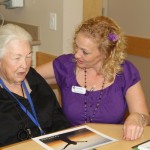
How to Demonstrate Empathy
Residents will often provide the most valuable information about what is going on for them through their voice and body language, rather than what they say. Using active listening skills, a group facilitator can help resident expand and elaborate on feelings.
By active listening we mean listening not just to the words said, but also looking for what is not being said. This allows you as a group facilitator to better pick up and reflect back what is going on. Here is a list of simple practical questions to use. Read more
Tips re Asking Questions
We sometimes fall into the trap of assuming we know how residents are feeling or what residents mean when they say “I’m not doing that well”, “I am lonely” or “I am depressed”. Asking questions can help the resident sort out what is going on, which is the first step to moving into a solution. This also helps them distinguish between thoughts and feelings as thoughts often lead to feelings. When asking the questions, it is helpful to remember two things:
1. make sure to leave space and time for resident to answer, and
2. give them permission to not share.
Concerns re Depression
One of the concerns long-term care staff often have is what to do when residents talk about issues such as depression. It is not the job of the group facilitator to fix the problems, but to walk alongside. Our role is to support them and give them a safe place to share at a pace that is comfortable for them. Having someone listen with care and attention is what they usually need the most.
The only exception being if a resident is expressing suicidal thoughts, it is critical to report this to the nurse in charge. If this happens, tell the resident after the group, that you are concerned and want to go with them to talk to the nurse. When in doubt, report it.
A Non-Judgemental Approach
A non-judgemental approach is key—one that is based on the belief that residents can help one another work through the challenges they are facing together. When we share our problems our worries, our fears, they seem to lose their power.
Staff can help group members express what is going on so that the other residents in the group can support them. Sometimes simply sharing what is going on is enough to help them cope.
Demonstrating Empathy: Key Questions to Ask
Here is a list of questions adapted from Essential Counselling and Therapy Skills (Nelson-Jones, 2002). It is not important that you ask the questions exactly as written or that you ask all of them. Try to end the questions however with number 6 and 7 – what helps you and is there anything the group can do to support you?
1. When you say “I’m not doing that well” (worried or depressed etc.), what exactly do you mean?
2. Can you tell me more about that feeling?
3. When did you start feeling that way?
4. Do you rarely feel that way, sometimes … or often?
5. On a scale of 0 – 10, (with 0 meaning not at all and 10 a lot), how strong is the feeling?
6. What helps you when you are feeling that way?
7. Is there anything the group can do to support you?
Reference
Nelson-Jones, R. (2002). Essential counselling and therapy skills: The skilled client model. London: Sage Publications.
